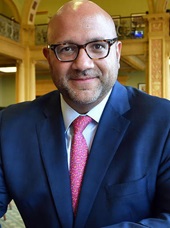About this step
The House Committee on Ways and Means examines the Governor's Proposal and releases its own recommmendations for the annual budget for deliberation by the House of Representatives. Prior to release of the House Ways and Means Budget, Joint Ways and Means Committee budget hearings are held across the state.

Dear Visitor:
Welcome to the Massachusetts House of Representatives Fiscal Year 2018 Budget Web Site. On this page you will find information and documents related to the House Ways and Means Budget, the full text of all Amendments offered by Representatives to the budget document, and the action taken by the House on those amendments. You can access this information by clicking here. Thank you for visiting this page, and please check back often!
The House Committee on Ways and Means has produced a balanced budget that includes no broad-based tax increases, reduces our reliance on one time revenue sources for the fourth consecutive year, and makes a commitment to rebuilding the state’s stabilization account. The Committee’s budget uses over a billion dollars less in one time revenues as compared to FY2015 and will deposit $100 million into the “Rainy Day” account. These reforms will produce a projected balance in the stabilization account at over $1.4 billion and help preserve the state’s AA+ bond rating.
Once again, the Committee’s budget delivers historically high levels of local aid to our partners at the municipal level with a commitment of $164 million in new funding. This budget includes a $40 million increase to Unrestricted General Government Aid (UGGA) and a $106 million dollar increase to Chapter 70 education aid. Including the proposed FY18 investments, the House of Representatives will have supported over $1 billion in new local aid funding in these two accounts since 2011. The increase to Chapter 70 guarantees that every school district will receive $30 per pupil in FY18. The proposed budget also adds $4 million to the special education circuit breaker and increases our investment in regional school transportation by $1 million.
Under the leadership of Speaker Robert A. DeLeo, the House Ways and Means budget prioritizes funding for early education and care with a focus on quality. The budget proposes a $15 million rate reserve for early educators. The rate reserve combined with other investments in the early education accounts will help to raise salaries and allow providers to recruit and retain high quality staff. This new funding ensures that Massachusetts’s youngest residents are receiving the best possible care during these highly formative years.
The House Ways and Means budget continues to lead the way towards the Commonwealth’s economic future by investing in higher education and workforce development. This budget increases funding to over $1.04 billion for the campuses across the state. The education provided at our community colleges, state universities and in the UMASS system is the key to unlocking career opportunities. We also look to guarantee that our students are prepared for the Science, Technology, Engineering and Math (STEM) based jobs of the future by investing $4.8 million in STEM starter academies. These academies work to improve student performance in STEM subjects and connect students with STEM fields of employment.
The Committee’s budget builds on previous investments in housing programs with over $18 million in new funding. Notably, we propose a $15 million increase to the Massachusetts Rental Voucher Program (MRVP). This increase will allow for up to 343 additional vouchers. The proposed budget also increases the Residential Assistance for Families in Transition (RAFT) program by $2 million and adds $1 million to programs assisting homeless individuals. These combined investments will help to continue a downward trend in caseloads for emergency shelters across the state.
The House Ways and Means budget provides expanded resources to help those struggling with substance abuse and mental health issues. Our new investments will increase the number of substance abuse treatment beds and recovery centers available in the Commonwealth and purchase 15,000 additional doses of Narcan. We also deliver a $1 million increase to support 87 new rental subsidies for Department of Mental Health clients, a $1.25 million increase for early childhood mental health grants, and expanded funding for a multi-agency geriatric mental health program.
The Ways and Means proposal is committed to protecting and providing for our Commonwealth’s most vulnerable residents. This budget guarantees that there will be no change in benefits for any transitional assistance recipient, annualizes the funding to support the 547 new social workers and case managers at the Department of Children and Families, and provides a $16.7 million increase at the Department of Developmental Services for the Turning 22 program. We also provide a $1.5 million increase to the Massachusetts Legal Assistance Corporation which will help support an additional 2265 new cases.
The House Ways and Means budget includes a new veteran’s tax credit. This is a two year, $2000 credit to eligible businesses for hiring veterans. Massachusetts is recognized as a leader in veteran’s services and we believe that this proposal will not only help our returning veterans but also their employers who benefit so much from the skills and experiences a veteran can bring to the workplace.
I would like to thank the members of the House Committee on Ways and Means for their input and perspective during the budget development process. I extend a special thank you to our Vice-Chair, Representative Stephen Kulik of Worthington, and our Assistant Vice-Chair, Representative Elizabeth A. Malia of Boston for their advice and assistance in creating this budget proposal.
I look forward to working closely with all the members of the House of Representatives in the upcoming debate. I believe that together we will build upon the Committee’s work and produce a budget that blends our shared priorities for our districts and our visions for Massachusetts.
Chairman
